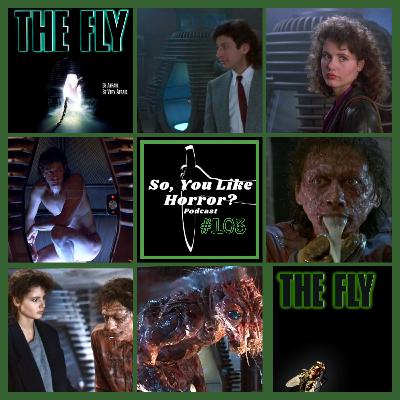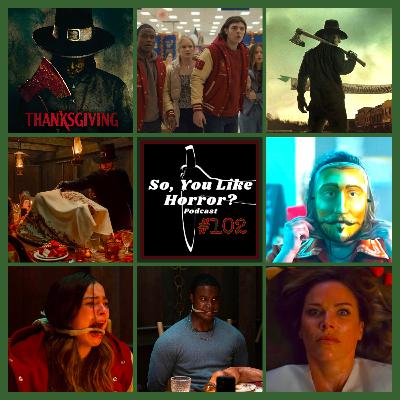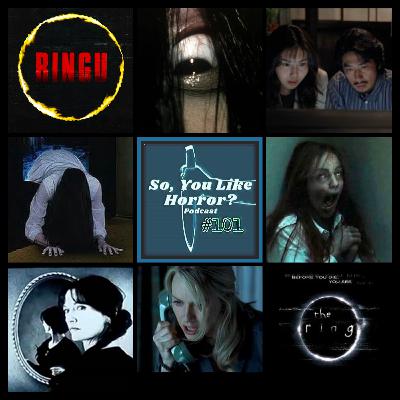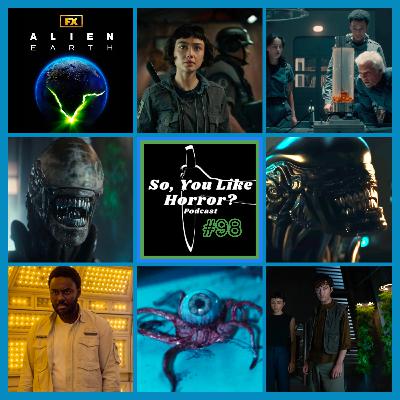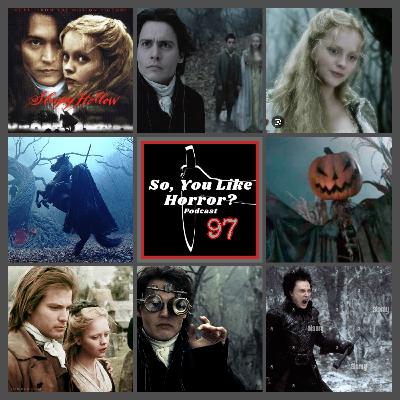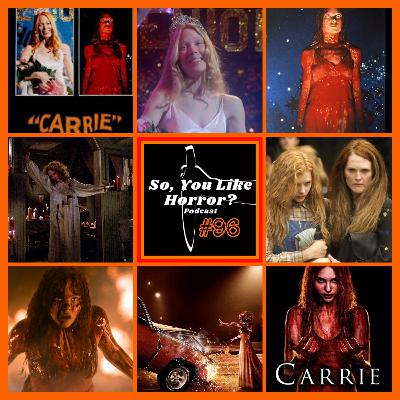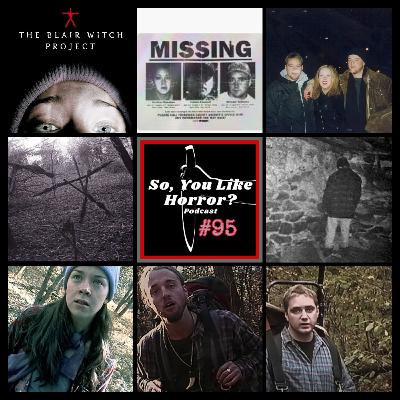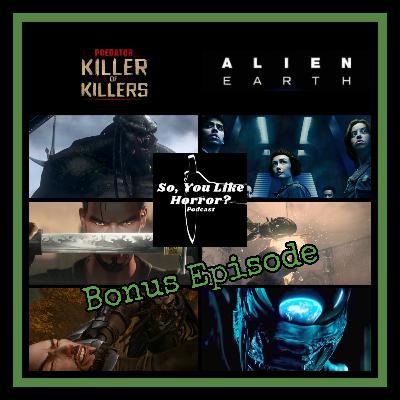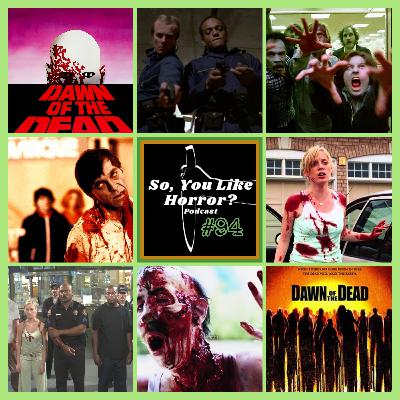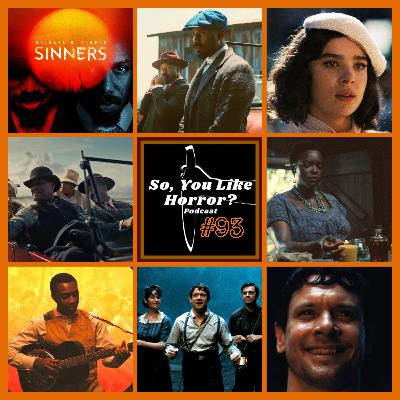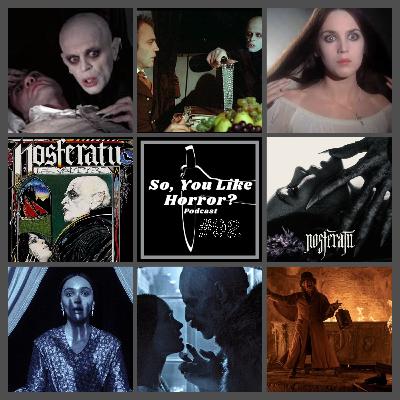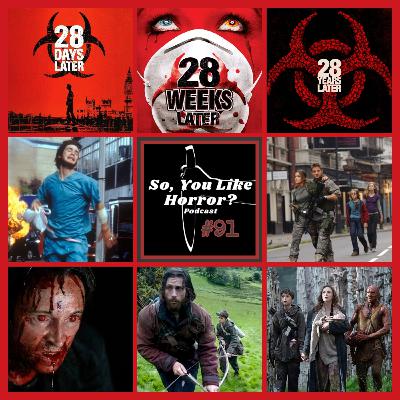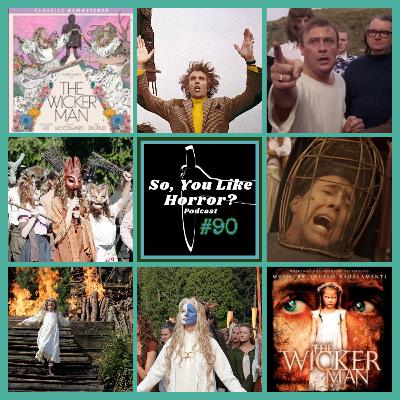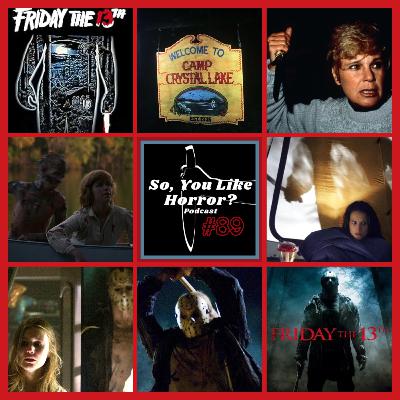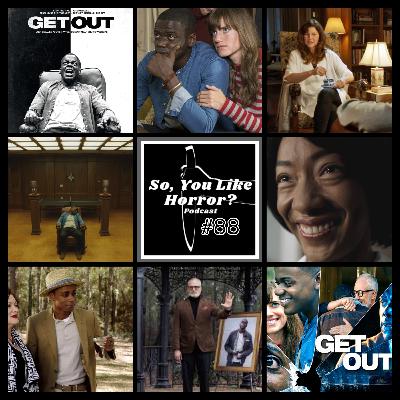Discover So, You Like Horror? Podcast
So, You Like Horror? Podcast

109 Episodes
Reverse
In 2026, So, You Like Horror? turns its focus to horror television and how fear unfolds over time. Across twelve episodes released throughout the year, the show will examine how episodic and serialized horror builds tension, develops character, and reflects cultural anxieties in ways that film often cannot.
Each month centers on a single series, exploring themes, narrative structure, historical context, and why the show continues to resonate. The lineup spans decades, formats, and audiences, from gateway horror and classic anthology television to modern prestige streaming series.
The 2026 series schedule includes The Haunting of Hill House, Are You Afraid of the Dark?, Midnight Mass, The Twilight Zone, Scooby-Doo, Where Are You!, Tales from the Crypt, Welcome to Derry, True Blood, Black Mirror, The Fall of the House of Usher, Lovecraft Country, and Them.
This year isn’t about rankings or shock value. It’s about understanding how horror changes when it has space to linger, how fear evolves through repetition, memory, and time.
New episodes release every 1st and 3rd Friday of the month throughout 2026. Watch along, revisit the shows, and explore what horror television reveals when the story doesn’t end after two hours.
Thank you, everyone, for your support. If you have any questions or concerns, feel free to reach out on Instagram at @so_you_like_horror or email us directly at soyoulikehorror@gmail.com. We're open to all conversations, suggestions, topics, and criticisms.
In this episode, I take a solo look at Black Christmas from 1974, a film often cited as a precursor to the modern slasher but better understood as a study in atmosphere, ambiguity, and unease. Set during Christmas break at a sorority house, the film builds tension through obscene phone calls, off-screen violence, and the unsettling idea that the threat is already inside the home.
Rather than focusing on gore or body count, Black Christmas relies on restraint, long takes, silence, and point-of-view shots that deny the audience clarity or comfort. The killer remains unseen and unexplained, turning absence itself into a source of horror. I discuss how this creative choice separates the film from later slashers and why its refusal to provide answers is central to its impact.
The episode also explores themes beneath the surface, institutional failure, dismissal of women’s fears, and the collapse of perceived safety. I examine the film’s bleak ending, its influence on later horror, particularly Halloween, and why Black Christmas still feels unsettling more than fifty years after its release. This is a conversation about dread over spectacle and why ambiguity can be more disturbing than resolution.
Thank you, everyone, for your support. If you have any questions or concerns, feel free to reach out on Instagram at @so_you_like_horror or email us directly at soyoulikehorror@gmail.com. We're open to all conversations, suggestions, topics, and criticisms.
In this episode of So, You Like Horror?, Guest hosts Maryland Phil and Chuckie O return to discuss Predator: Badlands and where it fits within the larger Predator franchise. They break down the film’s strengths and weaknesses, covering what works, what falls flat, and what stands out for better or worse. The conversation looks closely at how the PG-13 rating shapes the film’s tone, action, and tension, especially in comparison to earlier entries in the series.
They also examine how Predator: Badlands expands or reinterprets existing Predator lore and whether those choices strengthen the franchise or dilute its identity. They wrap up by ranking the film against other Predator installments and debating whether this entry justifies a direct sequel or should remain a standalone chapter.
Thank you, everyone, for your support. If you have any questions or concerns, feel free to reach out on Instagram at @so_you_like_horror or email us directly at soyoulikehorror@gmail.com. We're open to all conversations, suggestions, topics, and criticisms.
In this episode of So, You Like Horror?, I’m joined by Maryland Phil as we take a closer look at David Cronenberg’s The Fly (1986), a film that remains one of the most significant examples of body horror and one of the most meaningful horror remakes.
We talk about how the story evolved from a 1957 short story and a 1958 film into Cronenberg’s version, which shifts the focus toward illness, identity, and the fear of watching the body decline. We explore how the film reflects anxieties of the 1980s, from Cold War tension to the parallels many viewers saw with the AIDS crisis, and how those themes shape the way Seth Brundle’s transformation is understood today.
We walk through the film’s structure, from the initial scientific breakthrough to the escalation of physical and emotional deterioration, and how the relationship between Seth and Veronica grounds the horror in something human rather than spectacle.
From its commentary on obsession and scientific overreach to its portrayal of identity loss and the strain disease places on relationships, The Fly continues to resonate. Toward the end of the episode, we dig into the film’s legacy, the influence it had on later body-horror works, and why it’s often regarded as one of the strongest remakes in the genre.
Thank you, everyone, for your support. If you have any questions or concerns, feel free to reach out on Instagram at @so_you_like_horror or email us directly at soyoulikehorror@gmail.com. We're open to all conversations, suggestions, topics, and criticisms.
In this episode of So, You Like Horror?, I’m taking a close look at Thanksgiving (2023), Eli Roth’s holiday slasher that grew out of the fake Grindhouse trailer from 2007. I walk through the film’s plot, from the Black Friday riot that kicks everything off to the reveal of Sheriff Eric Newlon behind the John Carver mask. I break down how the story uses themes of consumerism, guilt, responsibility, and authority, and how the film blends satire with straightforward slasher elements. I also discuss what works, what doesn’t, and why the tone may feel uneven for some viewers. Toward the end, I go over what we know about the upcoming sequel, the possibilities for the sheriff’s return, and how the franchise might expand its holiday-horror identity. If you’re interested in where Thanksgiving fits within the larger tradition of seasonal slashers, or you’re curious about the direction the next film might take, this episode covers the key ideas, story beats, and commentary surrounding this new entry in the genre.
Thank you, everyone, for your support. If you have any questions or concerns, feel free to reach out on Instagram at @so_you_like_horror or email us directly at soyoulikehorror@gmail.com. We're open to all conversations, suggestions, topics, and criticisms.
Before The Conjuring and Paranormal Activity, there was a VHS tape that terrified Japan, and later, the world. In this episode of So, You Like Horror?, the Remake vs. Original series continues with Ringu (1998) and its American counterpart, The Ring (2002). We examine how Hideo Nakata’s minimalist, folklore-infused story of Sadako and a cursed videotape reshaped Japanese horror through quiet dread and psychological tension. Then we look at how Gore Verbinski’s Western adaptation reframed those fears for early-2000s audiences, turning superstition into investigation and amplifying its visual atmosphere through cold, haunting imagery. The conversation explores each film’s approach to technology, isolation, motherhood, and the concept of the “curse” itself, spiritual versus viral, suggestion versus spectacle. Through comparisons of style, theme, and cultural context, we ask the central question: Does The Ring enhance or dilute the terror of Ringu?
Thank you, everyone, for your support. If you have any questions or concerns, feel free to reach out on Instagram at @so_you_like_horror or email us directly at soyoulikehorror@gmail.com. We're open to all conversations, suggestions, topics, and criticisms.
In this 100th episode of the So, You Like Horror? Podcast, being released on Halloween, hosts Jake Dante, Sarah Beth, Maryland Phil, and Theresa examine two visions of Halloween: John Carpenter’s 1978 original and Rob Zombie’s 2007 remake.
The discussion looks at how each film interprets Michael Myers, from Carpenter’s silent embodiment of evil to Zombie’s psychologically driven killer shaped by violence and trauma. The hosts trace the evolution of the final girl through Laurie Strode, compare the suburban dread of late-1970s America with the gritty realism of the 2000s, and consider how atmosphere, tone, and cinematography define fear across generations.
Themes such as the nature of evil, loss of innocence, and the cycle of violence reveal what each version says about its era.
The episode closes with reflections on which portrayal of Halloween endures as the more unsettling vision of terror—and what keeps Michael Myers haunting audiences nearly fifty years later.
One hundred episodes later, So, You Like Horror? continues to be a space for honest conversation about the films, themes, and ideas that keep us coming back to the genre. Whether you’ve been listening since the beginning or just found us through this episode, thank you for being part of our growing horror community. Your thoughts, questions, and feedback help shape what we do next. If you’d like to connect, you can reach us on Instagram at @so_you_like_horror or by email at soyoulikehorror@gmail.com. Here’s to the stories that still unsettle us—and to the next hundred episodes ahead.
In Episode 99 of So, You Like Horror?, host Jake Dante is joined by Mannuel C. as they dive into Sinister (2012)... one of the most terrifying supernatural horror films of the 2010s. Directed by Scott Derrickson and starring Ethan Hawke, Sinister follows true-crime writer Ellison Oswalt as he uncovers a series of horrifying Super 8 home movies tied to a pagan deity known as Bughuul. The discussion breaks down the film’s haunting imagery, disturbing sound design, and the psychological unraveling that makes it “scientifically the scariest movie ever made.”
We explore how Sinister compares to Insidious and The Conjuring, analyze themes of obsession, ambition, and moral decay, and ask whether the true horror lies in the demon or in Ellison himself. From cursed films to corrupted innocence, this episode is a deep dive into the darkness that keeps horror fans awake at night.
Thank you, everyone, for your support. If you have any questions or concerns, feel free to reach out on Instagram at @so_you_like_horror or email us directly at soyoulikehorror@gmail.com. We're open to all conversations, suggestions, topics, and criticisms.
Welcome back, folks. This week on Episode 98 of So, You Like Horror?, Maryland Phil and Chucky O. return to break down Alien: Earth, the newest chapter in the iconic Alien franchise. This sci-fi horror podcast episode explores how Alien: Earth compares to previous entries like Alien, Aliens, and Alien: Romulus. They rank it among the franchise’s other entries, discussing standout moments, questionable story choices, and the series’s impact on the larger Alien universe.
Expect honest show criticism, and deep analysis of the story’s plot holes, character arcs, and horror elements.
Whether you’re a lifelong fan of Xenomorphs or discovering the series for the first time, this episode delivers everything from review insights to sci-fi chatter.
👉 Keywords: Alien Earth review, Alien franchise ranking, sci-fi horror podcast, movie review podcast, xenomorph analysis, horror film critique, Alien series discussion.
Happy Spooky Season, gang! In this week's episode of So, You Like Horror?, we ride into Tim Burton’s gothic masterpiece, Sleepy Hollow. Starring Johnny Depp as Ichabod Crane and Christina Ricci as Katrina Van Tassel, this supernatural horror classic reimagines Washington Irving’s legend with blood-soaked decapitations, fog-drenched forests, and Burton’s signature gothic flair.
We break down the film’s eerie plot, explore its blend of science and superstition, and discuss themes of corruption, trauma, gothic romance, and karmic justice. Was the true evil in Sleepy Hollow the Headless Horseman—or the human greed that summoned him? Join us as we unravel the film’s haunting atmosphere, lasting influence, and its place in horror history.
Thank you, everyone, for your support. If you have any questions or concerns, feel free to reach out on Instagram at @so_you_like_horror or email us directly at soyoulikehorror@gmail.com. We're open to all conversations, suggestions, topics, and criticisms.
Happy Halloween Eve, folks! This week on the podcast, we continue our remake vs original theme by discussing one of Stephen King’s most iconic stories—Carrie. First adapted by Brian De Palma in 1976, the film became a cultural touchstone, cementing its place in horror history with unforgettable performances and one of cinema’s most haunting finales.
Nearly four decades later, Kimberly Peirce’s 2013 remake attempted to bring the story into the modern age, complete with cyberbullying, viral humiliation, and CGI-driven destruction. We break down both versions, examining how Sissy Spacek’s painfully vulnerable Carrie compares to Chloë Grace Moretz’s more confident take, and how Piper Laurie’s religious fanatic Margaret White contrasts with Julianne Moore’s psychologically abusive portrayal. Along the way, we explore the themes of puberty, repression, bullying, and revenge, and ask the ultimate question: Does the remake add new depth to the story, or does it remain in the shadow of a classic?
Thank you, everyone, for your support. If you have any questions or concerns, feel free to reach out on Instagram at @so_you_like_horror or email us directly at soyoulikehorror@gmail.com. We're open to all conversations, suggestions, topics, and criticisms.
What's happening, folks? Welcome back to the podcast. This week, we dive into one of the most legendary—and controversial—films in horror history: The Blair Witch Project.
I'm joined by Rikki Tikki Timber, as we explore how this micro-budget indie shocked audiences, pioneered the found-footage style, and redefined horror marketing with viral websites, fake missing posters, and whispered rumors that it was all real.
We’ll break down the terrifying plot, from Heather, Mike, and Josh’s descent into paranoia in the Black Hills Forest to THAT chilling final shot. We’ll also discuss the film’s cultural impact, its role in sparking a found-footage boom (*Paranormal Activity, REC, Cloverfield*), and the recent controversy around the original cast’s lack of fair compensation despite the franchise’s massive success.
💀 Topics Covered:
- How *The Blair Witch Project* blurred reality and fiction
- Fear of the unknown vs. “showing the monster”
- Isolation, paranoia, and folk-horror roots
- Why audiences remain divided: masterpiece or overrated?
- Modern legacy: would it work in today’s TikTok era?
👉 What do YOU think—did The Blair Witch Project live up to the hype? Drop your thoughts in the comments!
📌 Don’t forget to like, subscribe, and hit the bell so you never miss an episode.
Follow us on Instagram: @so_you_like_horror
Support us on Ko-Fi: https://ko-fi.com/soyoulikehorrorpodcast
🚨 Bonus Episode Alert! 🚨
This week on the podcast, Maryland Phil and Chucky O. take over to discuss two franchises linked in so many ways, but separated in this instance.
First up: Predator: Killer of Killers — They share initial impressions, what worked, what didn’t, and why the Yautja lore still keeps us hooked. They talk about how humans clash with the hunters, the concern of skipping canon just to ramp up action, and their hopes for the upcoming Predator: Badlands. And they give a Good, Bad, and Ugly rundown. 🩸🔥
Then, they shift to Alien: Earth Episodes 1 & 2. How does it compare to Alien: Romulus? From nostalgia and horror vibes that don’t rely on cheap jump scares to new lore, tech, and creatures — they cover it all. They even break down the music choices in the credits and where this story fits in the Alien mythos timeline. Creepy, chilling, and cinematic. 🫣
🎧 Available now wherever you get your podcasts!
👉 Tap the link in bio to listen, and tell us in the comments: which franchise has you more hyped right now — Predator or Alien?
Thank you, everyone, for your support. If you have any questions or concerns, feel free to reach out on Instagram at @so_you_like_horror or email us directly at soyoulikehorror@gmail.com. We're open to all conversations, suggestions, topics, and criticisms.
Two Dawns. Two Malls. One Zombie Showdown. 🧟♂️
🧟♂️ Slow & shambling… or fast & feral?
It’s Dawn of the Dead (1978) vs. Dawn of the Dead (2004) — two malls, two zombie apocalypses, and one big question: Which one would you survive? 🩸
From Romero’s consumerism satire and iconic blue-skinned undead to Snyder’s sprinting chaos and relentless gore, we’re breaking down every bite, brawl, and blood-splatter in this ultimate zombie showdown.
🎧 Be sure to comment and let us know: Team Romero or Team Snyder?
#SoYouLikeHorror #DawnOfTheDead #HorrorRemake #ZombieCinema #HorrorCommunity #ZombieFans #HorrorMovieNight #HorrorTalk #HorrorGeek #CultHorror #RomeroZombies #HorrorContentCreator #UndeadApocalypse
What's happening, friends? This week on the podcast, Sarah Beth and I wanted to talk about Ryan Coogler’s vampire tale, Sinners, set in 1932 Clarksdale, Mississippi.
Blending supernatural horror with rich historical and cultural themes, Sinners tells the story of twin brothers Smoke and Stack, who return to the Deep South to open a juke joint with stolen mob money, only to find themselves battling not just racism and family tensions, but a growing vampiric threat led by an Irish bloodsucker named Remmick. What unfolds is a confrontation between tradition and temptation, freedom and survival.
We break down the film scene by scene, from opening night at the juke joint to the tragic brother-versus-brother showdown, and reflect on its layered themes: music as cultural magic, vampirism as a metaphor for racial exploitation, and the emotional weight of grief, family, and sacrifice. Sinners offers a powerful reminder that immortality is hollow without humanity—and that true endurance lies in memory, music, and love.
Thank you, everyone, for your support. If you have any questions or concerns, feel free to reach out on Instagram at @so_you_like_horror or email us directly at soyoulikehorror@gmail.com. We're open to all conversations, suggestions, topics, and criticisms.
Greetings, folks, and welcome back. This week on the podcast, we examine the shadowy legacy of one of horror’s most iconic tales, Nosferatu.
Joined by guest hosts Amy and Jenn, we explore how this vampiric nightmare has evolved across generations by comparing Werner Herzog’s somber 1979 reimagining Nosferatu the Vampyre with Robert Eggers’ highly stylized and psychologically harrowing 2024 interpretation.
We begin by tracing the origin of Count Orlok back to the 1922 silent classic and examine how its unauthorized adaptation of Dracula helped shape the language of horror cinema. From there, we break down the distinct tones, themes, and visual styles of the two remakes—Herzog’s mournful plague-soaked atmosphere versus Eggers’ surreal descent into obsession and dread.
We compare portrayals of Orlok himself, with Klaus Kinski’s tragic isolation contrasting Bill Skarsgård’s primal menace. The conversation dives deep into symbolism and German Expressionist influences that haunt both versions.
Whether you're drawn to the slow decay of the 1979 film or the claustrophobic terror of 2024, this episode dares to ask: Which Nosferatu lingers in your nightmares?
Thank you, everyone, for your support. If you have any questions or concerns, feel free to reach out on Instagram at @so_you_like_horror or email us directly at soyoulikehorror@gmail.com. We're open to all conversations, suggestions, topics, and criticisms.
Greetings, folks! This week on the podcast, I'm joined by George Ivanoff as we take a deep dive into the apocalyptic trilogy that redefined modern horror—28 Days Later, 28 Weeks Later, and the freshly released 28 Years Later.
We begin by revisiting 28 Days Later, Danny Boyle’s 2002 classic that launched fast-moving infected into the genre and delivered a raw, emotionally charged vision of a crumbling society. The film's meditations on loneliness, moral decay, and the fragility of civilization still resonate, especially in today’s world.
Next, we explore 28 Weeks Later, a sequel that shifts focus from personal survival to institutional failure, showing how military efforts to contain the Rage Virus collapse under pressure, leading to brutal consequences.
Finally, we unpack 28 Years Later, a bold continuation that pushes the franchise into a post-pandemic landscape. Set decades after the original outbreak, the film centers on a new generation, examining tribalism, generational trauma, and hope amid a fractured, quarantined Britain.
Thank you, everyone, for your support. If you have any questions or concerns, feel free to reach out on Instagram at @so_you_like_horror or email us directly at soyoulikehorror@gmail.com. We're open to all conversations, suggestions, topics, and criticisms.
What's up, you culty loons? This week on the podcast, I sit down with Scott Thomas to dissect one of horror’s most infamous remake showdowns—The Wicker Man (1973) vs. The Wicker Man (2006). We explore the allure of the 1973 folk horror classic, examining its themes of religious conflict, sexual repression, blind faith, and cultural relativism.
Then, the conversation shifts to Nicolas Cage’s wild 2006 remake—a film that’s equal parts psychological thriller, fever dream, and meme-worthy chaos. The episode dives deep into how both versions tackle community versus individualism, human sacrifice, and the symbolic power of ritual.
From the haunting folk songs of the original to the unforgettable “Not the bees!” moment, this discussion pulls apart the artistic intentions, thematic contrasts, character dynamics, and cult legacies of two very different films with the same burning finale.
Whether you're a purist or just here for the insanity, this episode offers a thoughtful journey through one of horror’s strangest cinematic rituals.
Thank you, everyone, for your support. If you have any questions or concerns, feel free to reach out on Instagram at @so_you_like_horror or email us directly at soyoulikehorror@gmail.com. We're open to all conversations, suggestions, topics, and criticisms.
What's up, freaks? This week on the podcast, I tackle the legacy of Friday the 13th by comparing the 1980 original to its 2009 remake.
We begin with a breakdown of both films—Sean S. Cunningham’s suspenseful whodunit that introduced Pamela Voorhees as one of horror’s earliest female slashers, and Marcus Nispel’s grittier reimagining that transformed Jason into a brutal, territorial hunter. We discuss how the two films differ in structure, tone, violence, character archetypes, and especially in the portrayal of Jason—from a tragic child’s memory to a relentless predator with survivalist instincts.
Despite their differences, both versions share familiar slasher elements: the eerie setting of Camp Crystal Lake, the indulgent teen victims, and the iconic “ki ki ki, ma ma ma” score that still signals incoming doom. We explore recurring themes like grief, vengeance, trauma, and morality, while also unpacking how the franchise has evolved with the times.
Finally, we examine the franchise’s stalled cinematic future, the ongoing legal battle that’s frozen Jason’s return, and the hope offered by A24’s upcoming Crystal Lake prequel series.
Thank you, everyone, for your support. If you have any questions or concerns, feel free to reach out on Instagram at @so_you_like_horror or email us directly at soyoulikehorror@gmail.com. We're open to all conversations, suggestions, topics, and criticisms.
What’s happening, spooky folk? This week on the podcast, I welcome back Rikki Tikki Timber to break down Jordan Peele’s psychological horror film Get Out.
We explore how Peele uses suspense, dark humor, and disturbing visuals to highlight themes of racism, identity erasure, and control. From the unforgettable “Sunken Place” scene to the coded language of liberal hypocrisy at the Armitage family’s dinner party, we dissect the film’s layered metaphors and social commentary.
We also examine key characters like Chris, Rose, and Rod, and how their roles reflect broader societal dynamics. Together, we dive into the symbolism behind the mysterious "Behold the Coagula" and the Death Cheetah vs. Matter poster in Chris's apartment—unpacking how they enrich the narrative’s deeper messages.
Plus, we discuss the film’s original, darker ending and why Jordan Peele chose to give audiences a rare moment of triumph. This episode is meant to be a tense, thoughtful, and sometimes uncomfortable conversation, but it’s Rikki and I, so we got jokes that are probably not ok.
Thank you, everyone, for your support. If you have any questions or concerns, feel free to reach out on Instagram at @so_you_like_horror or email us directly at soyoulikehorror@gmail.com. We're open to all conversations, suggestions, topics, and criticisms.





